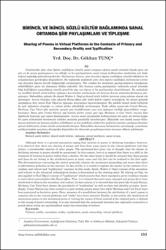| dc.contributor.author | Tunç, Gökhan | |
| dc.date.accessioned | 2019-10-18T19:26:44Z | |
| dc.date.available | 2019-10-18T19:26:44Z | |
| dc.date.issued | 2016 | |
| dc.identifier.issn | 1300-3984 | |
| dc.identifier.uri | http://www.trdizin.gov.tr/publication/paper/detail/TWpFd05qWXdNQT09 | |
| dc.identifier.uri | https://hdl.handle.net/11421/11577 | |
| dc.description.abstract | Günümüzde şiire olan ilginin azaldığına yönelik genel yargının aksine sanal ortamda birçok şaire ait şiir ya da mısra paylaşımının var olduğu ve bu paylaşımların sanal ortam kullanıcıları tarafından çok fazla beğeni topladığı gözlemlenmektedir. Söz konusu durum, şiire duyulan ilginin azaldığına yönelik iddiaların da sorgulanması gerektiğini düşündürür. Bu bağlamda makalede şiire olan ilginin azaldığını söylemenin yerine ona duyulan ilginin nitelik değiştirdiği savlanmıştır. Öte yandan bu mısra/şiir paylaşımlarının birçoğunun atfedildikleri şaire ait olmaması dikkat çekicidir. Söz konusu yanlış paylaşımlar nedeniyle sanal ortamda bilgi kirliliğinin yaşandığına yönelik genel bir algı var olmuş ve bu paylaşımlar eleştirilmiştir. Bu makalede ise özellikle ikincil sözlü kültür, tipleşme kavramları merkezinde söz konusu durum anlamlandırılmaya çalışılmıştır. Bahsedilen çabada ilk olarak Walter J. Ong'un ikincil sözlü kültür kavramı çıkış noktası olarak ele alınmıştır. Ayrıca Ong'dan yola çıkarak Karac'oğlan gibi sözlü kültür tipleri aracılığıyla bir şiirsel gelenek oluştuğunu ileri süren Öcal Oğuz'un tipleşme kavramına başvurulmuştur. Bu şekilde ikincil sözlü kültürde de şair tiplerinin oluştuğu ve onlara şiirler atfedildiği savlanmıştır. İfade edilen çerçevede Cemal Süreya, Mevlana, Can Yücel gibi şairlerin gerçek şair kimliklerinin yanı sıra tipleşme özelliği gösterdikleri vurgulanmıştır. Buna göre Cemal Süreya aşk konulu şiirler yazan şair tipi; Mevlana ve Can Yücel, hayata dair öğütlerde bulunan şair tipine dönüşmüştür. Ayrıca sanal ortamlarda kullanıcıların bir şaire ait ürünü başka bir şaire atfetmeleri durumuyla cönkler arasında paralellik kurulmuştur. Makalede son olarak yazarı bilinmeyen şiirlerin söz konusu şairlere atfedilmesi ya da yazdıkları şiirlere bu şairlerin isminin yazılması durumu şiirsel mülkiyetin yitimi olarak anlamlandırılmıştır. Bahsedilen durumun kelimelerin metalaştığı, yazarların mülkiyetindeki metalara dönüştüğü düşünülen bir dönemde gerçekleşmesinin önemine dikkat çekilmiştir | en_US |
| dc.description.abstract | Although there is a general perception urging that interest in poetry is declining nowadays, however, it is observed that there are sharing of poems and lines from many poets in the virtual platforms and they attract a considerable interest of other people. The mentioned fact gives rise to thought that the claims on declining interest in poetry should be questioned. In this context, here it is argued that there is a shift in the character of interest in poetry rather than a decline. On the other hand, it should be stressed that these poems and lines do not belong to the attributed poets in many cases and this fact can be realized at the first sight. The determinations concerning the matter generally criticize the mentioned misguiding and assert that there is information pollution on the internet. In this article, it is aimed to explain the matter in the contexts of secondary oral culture and "typification" concepts. In this study, firstly, Walter J. Ong's concept of the secondary oral culture in the advanced technological means is determined as the starting point. By relying on Ong, we also applied to Öcal Oğuz's concept of "typification" which asserts that there emerged a poetic tradition thanks to oral culture personalities like Karac'oğlan. Thus, it is claimed that poet types emerged and poems have been attributed to them in the secondary oral culture. In this context, it is stressed that the poets like Cemal Süreya, Mevlana, Can Yücel have shown the peculiarity of "typification" as well as their real identity as poets. Accordingly, Cemal Süreya has been turned to a poet writing poems about love while Mevlana and Can Yücel have been portrayed as hortative poets. Here, presence of a parallelism between the attribution of a poet's poem to someone else in the virtual platforms and "cönks" have been asserted. Finally, in the article, the attribution of anonymous poems to the mentioned poets or writing the names of them instead of the original poets is defined as the losing of poem's ownership. It is also stressed that the mentioned situation has especially occurred in a period when words are merchandised under the ownership of writers | en_US |
| dc.language.iso | tur | en_US |
| dc.rights | info:eu-repo/semantics/openAccess | en_US |
| dc.subject | Folklor | en_US |
| dc.title | Birincil ve İkincil Sözlü Kültür Bağlamında Sanal Ortamda Şiir Paylaşımları ve Tipleşme | en_US |
| dc.title.alternative | Sharing of Poems in Virtual Platforms in the Contexts of Primary and Secondary Orality and Typification | en_US |
| dc.type | article | en_US |
| dc.relation.journal | Milli Folklor Dergisi | en_US |
| dc.contributor.department | Anadolu Üniversitesi, Açıköğretim Fakültesi, Türk Dili ve Edebiyatı Bölümü | en_US |
| dc.identifier.volume | 14 | en_US |
| dc.identifier.issue | 109 | en_US |
| dc.identifier.startpage | 153 | en_US |
| dc.identifier.endpage | 161 | en_US |
| dc.relation.publicationcategory | Makale - Ulusal Hakemli Dergi - Kurum Öğretim Elemanı | en_US |


















